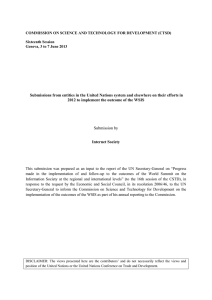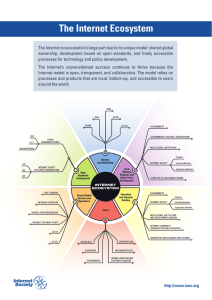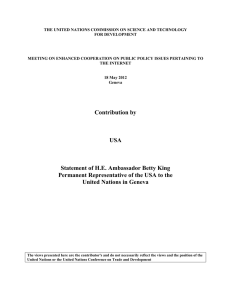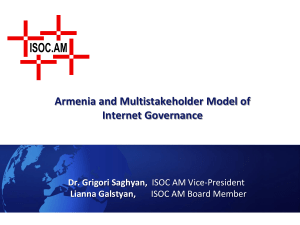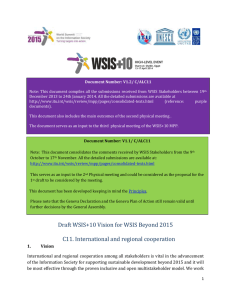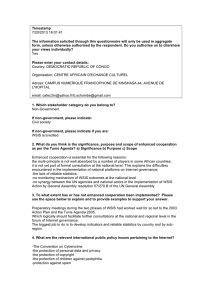COMMISSION ON SCIENCE AND TECHNOLOGY FOR DEVELOPMENT (CSTD) Fifteenth Session
advertisement
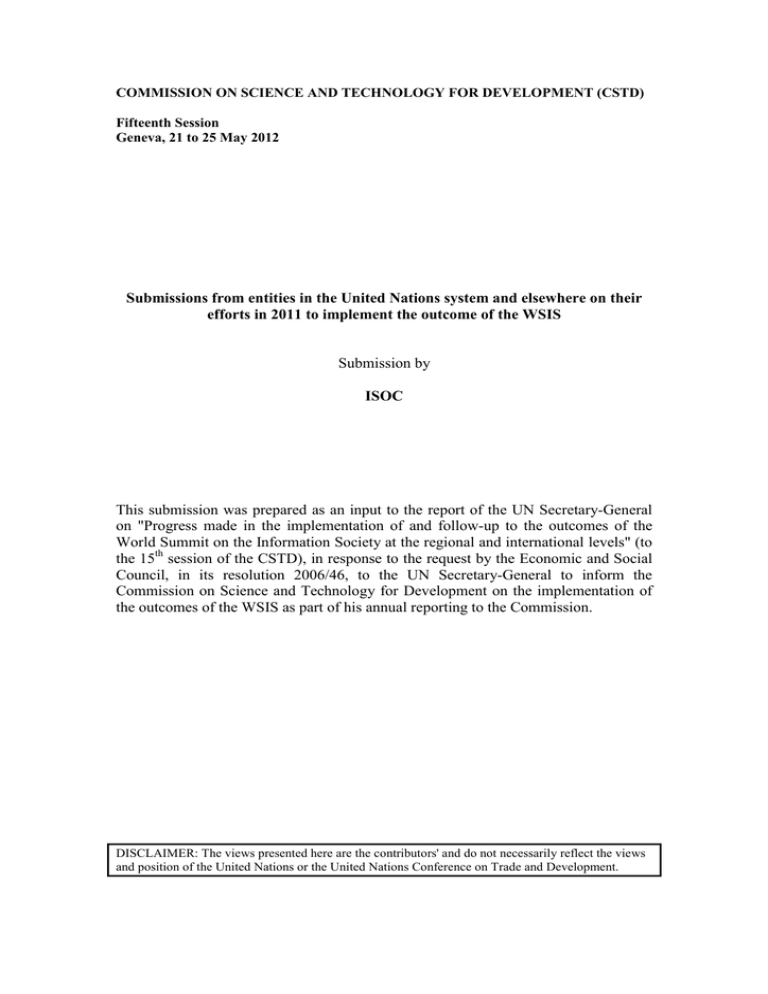
COMMISSION ON SCIENCE AND TECHNOLOGY FOR DEVELOPMENT (CSTD) Fifteenth Session Geneva, 21 to 25 May 2012 Submissions from entities in the United Nations system and elsewhere on their efforts in 2011 to implement the outcome of the WSIS Submission by ISOC This submission was prepared as an input to the report of the UN Secretary-General on "Progress made in the implementation of and follow-up to the outcomes of the World Summit on the Information Society at the regional and international levels" (to the 15th session of the CSTD), in response to the request by the Economic and Social Council, in its resolution 2006/46, to the UN Secretary-General to inform the Commission on Science and Technology for Development on the implementation of the outcomes of the WSIS as part of his annual reporting to the Commission. DISCLAIMER: The views presented here are the contributors' and do not necessarily reflect the views and position of the United Nations or the United Nations Conference on Trade and Development. February 2012 UNITED NATIONS COMMISSION ON SCIENCE AND TECHNOLOGY FOR DEVELOPMENT (CSTD) SUMMARY OF ACIVITIES UNDERTAKEN BY THE INTERNET SOCIETY RELATED TO IMPLEMENTATION OF THE TARGETS, RECOMMENDATIONS AND COMMITMENTS OF THE WORLD SUMMIT ON THE INFORMATION SOCIETY INTRODUCTION The Internet Society is a nonprofit organization founded in 1992. It is the world’s trusted independent source of leadership for Internet policy, technology standards and future development. Based on its principled vision and substantial technological foundation, the Internet Society works with its members and Chapters around the world to promote the continued evolution and growth of the open Internet through dialog among companies, governments, and other organizations around the world. The Internet Society acts as a global clearinghouse for Internet information and capacity building and as a facilitator and coordinator of Internet-related initiatives around the world. For 20 years ISOC has run international network training programs for developing countries and these have played a vital role in setting up the Internet connections and networks in virtually every country connecting to the Internet during this time. With more than 50,000 individual members and over 100 organizational members, the Internet Society represents a global network of corporations, nonprofit associations, and people. ISOC has regional bureaus to better serve the regional Internet community. The Latin American and Caribbean bureau is located in Buenos Aires, Argentina, the African bureau in Addis Ababa, Ethiopia, the European Bureau in Brussels, Belgium, the South and Southeast Asian bureau in Singapore, and the North American bureau is located in Reston, Virginia, USA. Through its sponsored events, developing-country training workshops, tutorials, public policy, and regional and local chapters, the Internet Society serves the needs of the growing global Internet community. From commerce to education to social issues, our goal is to enhance the availability and utility of the Internet on the widest possible scale. The Internet Society was accredited to the WSIS during its first phase and participated actively in the entire preparatory process and in the Geneva and Tunis Summits themselves. Since the Tunis Summit, the Internet Society has been actively involved in support of implementing the targets, recommendations, and commitments of the WSIS as they pertain to the Internet, and to Internet Governance. This brief report provides a summary of ISOCʼs activities, and the lessons learned from our experience. INTERNET GOVERNANCE The Internet Society recognizes the Internet Governance Forum as one of the most active and successful outcomes of the WSIS. As an organization ISOC has contributed financially to the operation of the IGF each year, has participated in the Multistakeholder Advisory Group (MAG) to the Secretary-General, and assisted MAG members from developing countries to participate. ISOC has organized workshops at the IGF and worked with all other stakeholders to make the IGF a success. We are also active participants in the CSTD Working Group on Improvements to the IGF. One of our largest commitments has been to establish an ISOC IGF Ambassador programme that brings qualified participants to the IGF from around the world and from all stakeholder groups to learn and to teach about Internet governance. More than half of the 2011 Ambassadors, for example, came from developing countries, and were from governments, academic institutions, businesses, and civil society. ISOC believes the value of the IGF is its ability to bring together Internet Society InternetSociety.org info@isoc.org Galerie Jean-Malbuisson, 15 CH-1204 Geneva Switzerland Tel: +41 22 807 1444 Fax: +41 22 807 1445 1775 Wiehle Ave. Suite 201 Reston, VA 20190, USA Tel: +1 703 439 2120 Fax: +1 703 326 9881 February 2012 people who might not otherwise meet. Please refer to our website for further information about our involvement with the Internet Governance Forum. <see: http://www.internetsociety.org/who-weare/related-and-partner-organisations/our-community-and-partners/igf> WSIS ACTION LINES The Internet Society also works with all other stakeholders in ways that contribute to the implementation of several of the WSIS Action Lines, such as the following. C.1: The role of public governance authorities and all stakeholders in the promotion of ICTs for development, and C.11: International and regional cooperation The Internet Society is active in public policy discussions related to the Internet at the global, regional and national levels. The WSIS has contributed greatly to awareness of the importance of the multistakeholder approach in achieving good public governance. In pursuing our public policy objectives, ISOC operates collaboratively and inclusively, working with governments, national and international organizations, civil society, the private sector and other parties to reach decisions about the Internet that conform to our core values. Since the WSIS, ISOC has expanded collaboration with intergovernmental organizations, including such examples as the Organization for Economic Cooperation and Development (OECD), the African Union, APEC, WIPO, the Organization of American States/Inter-American Telecommunication Commission, and with national governments to promote the expansion of the Internet around the world. <see: http://www.internetsociety.org/who-we-are/our-community-and-partners> One concrete example of expanded international cooperation is ISOC’s participation in the Technical Advisory Committee (ITAC) of the OECD’s Information, Computer and Communication Policy Committee (ICCP). This new body was created in 2008 to provide information and expert advice to assist and improve the public policy process addressing a wide range of topics, such as information security and privacy, critical infrastructures (such as IPv6), Internet economy and innovation issues. In June 2011 ITAC had the opportunity to engage in negotiations on the formal outcome of the High Level Meeting on the Internet Economy, on an equal footing with OECD member countries. This is one highly visible instance that demonstrates the benefits to all stakeholders that come about from enhanced cooperation among them. C2. Information and communication infrastructure As the organizational home for the groups responsible for Internet infrastructure standards, including the Internet Engineering Task Force (IETF) and the Internet Architecture Board (IAB), the Internet Engineering Steering Group (IESG), and the Internet Research Task Force (IRTF), the Internet Society is deeply involved in the development of Internet standards and technology. These are the standards setting and research arms of the Internet community. These are open organizations, relying on transparent, bottom-up processes to build consensus. Thousands of people from around the world participate in the process and the standards they develop are free and accessible to everyone. ISOC also works with other technical organizations, such as the International Telecommunication Union (ITU) and the World Wide Web Consortium (W3C) to support and enhance existing standards efforts, promote coordination between them, to identify gaps and ways to fill them, and to maximize the usability of open standards. The WSIS has recognized the vital role played by open standards in the development of ICTs, and our work with all interested stakeholders forms a second major contribution that ISOC has played in implementing the WSIS commitments. The Internet Society has also collaborated with the Organization for Economic Co-operation and Development (OECD) and the United Nations Educational, Scientific and Cultural Organization (UNESCO) on a study on the "Relationship between Local Content, Internet Development and Access Prices”. One of the study’s focus was to look at the positive inter-linkages between higher levels of local digital content creation and better Internet connectivity. <Main findings and conclusions: http://www.unesco.org/new/fileadmin/MULTIMEDIA/HQ/CI/CI/pdf/news/local_content_study.pdf> 2 February 2012 C4. Capacity building The Internet Society devotes significant resources to initiatives aimed at development and particularly capacity building. These efforts focus on technical and policy capacity building, select infrastructure enhancement projects, and enabling access for underserved communities. For the Internet to grow and be sustainable, network operators need the technical capacity necessary to build, maintain, and protect networks, as well as make informed choices about new infrastructure implementations and methodologies. With Internet technology changing rapidly, capacity building needs to be an ongoing process and local information-sharing mechanisms must be in place to sustain knowledge transfer beyond classroom trainings. ISOCʼs technical capacity building program aims to train network operators on basic and advanced internetworking skills and techniques, to build regional and functional operator communities that can maximize knowledge, experience, skills transfer, and problem solving, and to foster technical leadership within communities that sustain and advance local capacity and more fully participate in regional and global Internet technical and governance forums. As part of these efforts, ISOC has undertaken a range of capacity building trainings, events, and seminars around the world, with a specific emphasis on emerging economies and developing countries, and in partnership with other Internet community organizations. As such, ISOC places significant emphasis in organizing, supporting, and participating in hands-on technical training for Internet engineers in emerging economies and developing countries. For example, ISOC hosts training and workshops on a range of network development and operational skills, including network administration and monitoring, bandwidth and critical resource management, advanced routing (IPv4/IPv6), wireless networking, and Internet services, among other topics, in various in-country locations ranging from Latin America and the Caribbean, Africa, and Asia. ISOC also works in conjunction with Internet community colleagues such as AfriNIC, AfNOG, RIPE-NCC, APNIC, and LacNIC, to conduct regional technical trainings and forums such as the Middle East Network Operators Group (MENOG), the South Asian Network Operators Group (SANOG), the Workshop on Internet Networks Technologies for Latin America and the Caribbean (WALC), and AfCHIX, a regional training workshop specifically aimed at women Internet engineers in Africa. Through our direct trainings and partnership projects, ISOC reaches some 600+ emerging economy and developing country engineers per year with vital skills and knowledge that supports Internet growth and development. At the same time, ISOC works to build capacity by engaging in targeted regional and local projects that improve Internet infrastructure and regional economics. For example, ISOC has undertaken a comprehensive project in Africa and Latin America to improve the interconnection and traffic exchange landscape on the continents and help launch and/or improve Internet Exchange Points (IXPs) in countries where they have not yet been established or are seeking to advance their operations. The work encompasses a range of activities, from technical training, operational and implementation guidance, assistance with local stakeholder coordination efforts, and information for policymakers and regulators about the role of IXPs and related interconnection and traffic exchange issues. In 2011, ISOC collaborated with local stakeholders in launching and/or enhancing national IXP infrastructures in Lesotho, Ghana, Mozambique, Malawi and Argentina. Further, our work with the Kenyan Internet Exchange Point (KIXP) helped fostered an 85% increase in East African networks peering through KIXP, helping it to improve regional Internet traffic exchange in East Africa. We also launched the African Interconnection and Peering Forum (AfPIF) <www.afpif.org> to assist African stakeholders in addressing the key Interconnection opportunities and challenges on the continent and facilitate the sharing of global and local strategies for lowering interconnection and traffic exchange costs. We also worked with our Internet community partners in Latin America to facilitate the launch of LAC-IX, an association of IXP operations in that region. ISOC also works with local communities across the globe on practical projects that bring Internet connectivity to communities lacking sufficient access and empower human potential. Recent projects include working in collaboration with Fongtil (a Timorese NGO) to provide low-cost wireless Internet connectivity in Dili, Timor Leste, one of the poorest countries in Asia, promoting local Internet content development in the Amharic language of Ethiopia, developing an Internetconnected community center catering to poor, elderly residents of the Harlem neighborhood in New 3 February 2012 York city, and helping to connect schools and after-school computer learning centers in the community of Lascahobas, Haiti, among others. These projects take advantage of the diversity of expertise within ISOC’s own membership, including our world-wide network of Chapters, and encourages them to work with other stakeholders in their local communities. ISOC Community Grants program is specifically aimed at this purpose. <see: http://internetsociety.org/what-wedo/grants-and-awards/grants/community-grants> Together, these programs support vital community-based, capacity building and ICT4D innovation work in developing countries around the world. Last but not least, ISOC’s Next Generation Leaders programme enables Internet professionals between the ages of 20 and 40 to develop their leadership potential where technology, business, policy, and education intersect. The curriculum includes fellowships to major Internet events (such as the IGF, IETF, OECD and World Bank) as well as an eLearning component administered by DiploFoundation in partnership with the Internet Society. <see: http://www.internetsociety.org/whatwe-do/leadership-programmes/next-generation-leaders-ngl-programme> C.10: Ethical dimensions of the Information Society In early 2011, major popular movements in North Africa and the Middle East have emphasized how instrumental the Internet has become in voicing citizens’ aspirations for freedom and change. ISOC considers the Internet as an enabler for a wide range of human rights, such as the right to freedom of expression and opinion and the right to association. However, the exercise of these basic rights could hardly be possible if not for principles that have shaped the Internet model of development, such as openness, transparency and access. These dimensions cannot be taken for granted; an increasing amount of government initiatives have been imposing legal and technical controls on their citizens’ access and use of the global network, without due regard to an individual’s ability to exercise their fundamental human rights. ISOC has participated in several Human Rights Council meetings (HRC) in 2011. We have supported the creation of a panel on the promotion and protection of freedom of expression on the th Internet, which will convene at the 19 HRC in 2012. We will endeavor to continue our ongoing engagement on this issue in relevant forums (e.g. IGF, WSIS Forum), in close cooperation with other stakeholders. The Internet Society also participated to UNESCO's drafting group on the Code of Ethics in the Information Society, offering technical and legal expertise to UNESCO staff and governmental delegates. Finally, ISOC has contributed to several debates or consultations related to ethics and human rights, such as the Council of Europe’s Internet Governance Principles and Recommendation concerning the Protection and Promotion of the Internet’s Universality, Integrity and Openness, as well as the European Group on Ethics (EGE)’s consultation on the Ethical Aspects of Information and Communication Technologies. CONCLUSION The foregoing is only a partial list of the Internet Societyʼs activities related to implementation of the targets, recommendations and commitments of the WSIS, but it is indicative of the breadth of our involvement with the WSIS process. In addition to the work done by ISOC staff, we know that our extensive network of Chapters, corporate and individual members are also deeply engaged in a vast number of activities that contribute to the development of the information society. From the perspective of a not-for-profit organization such as ISOC, there can be no doubt that the innovations and openness that the WSIS brought to all the organizations and stakeholders involved has continued into the implementation phase. We welcome the opportunity to be a part of this effort, and look forward to continuing to work with others to contribute. 4
